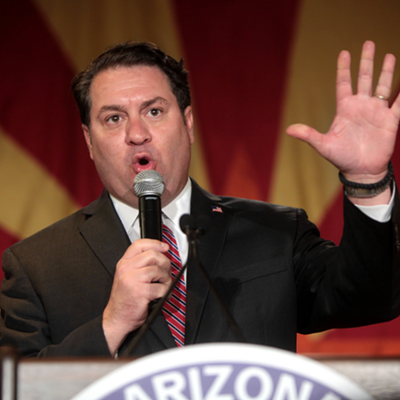STAGE FRIGHT
Downtown developers Scott Stiteler and Don Martin stepped in front of the Tucson City Council last week to work out a few points in their complicated relationship with the city.
As the Tucson Weekly has been reporting in recent months (see Dave Devine's accompanying story on this page), Stiteler and Martin—who own the Rialto block, along with some other properties—are trying to persuade the council to give them $4 million in city-owned land, including the old Volvo dealership on Broadway Boulevard east of downtown, and a portion of the Ronstadt Transit Center on Congress Street. In exchange, the developers would rehab the Rialto block, construct some affordable housing on Toole Avenue in the Warehouse District and hand out money to various arts groups. (We heard at a recent meeting of the Warehouse Arts Management Organization that the affordable-housing component may be dropped.)
One major sticking point: the Rialto Theatre, which is owned by the city and managed by the nonprofit Rialto Theatre Foundation. The foundation and its executive director, former Tucson Weekly owner Doug Biggers, are asking the developers to hand over some property adjacent to the theater that's vital to the Rialto's continued operation. Given that the Rialto is one of Rio Nuevo's few success stories, bringing more than 300,000 people downtown to more than 484 concerts over the last four years, we believe that's a reasonable request.
Martin tried to convince the City Council that the Rialto just needed to make a deal with the developers to open a bar together and split the profits, but Michael Crawford, the chairman of the Rialto board, made it clear that the foundation had no interest in going into the bar business with Martin and Stiteler.
Council members appeared to agree with Crawford and encouraged the developers to work out an agreement to give the foundation the property. As of press time, negotiations were underway.
If Martin and Stiteler can't be persuaded to give the city the property that the Rialto needs, the council should reject the entire deal, which is scheduled to come up for a vote on Tuesday, June 16.
CLINGING TIGHTLY TO THEIR SPENDING PLAN
Republicans in the Arizona Legislature cobbled together enough votes to pass a budget last week, but they're sitting on it rather than sending it to Gov. Jan Brewer, who isn't happy with the spending plan.
In broad strokes, the GOP budget cuts about $630 million, including $220 million from K-12 education and $40 million from the universities. It also puts off about $143 million in bills until next year and sweeps $437 million from various state funds. It privatizes prison management and mortgages the prisons for $595 million.
With a little help from Uncle Sam's stimulus package—worth about $1.2 billion—and a little more fiscal magic, they manage to bridge a $3.1 billion shortfall.
Brewer and the Democrats say that cuts to the universities threaten a billion dollars in education stimulus money from the feds, but Republican leaders are saying they just don't believe that. Well, whom are you going to trust? Sen. Russell Pearce, or people who actually talk to the federal officials who decide how the stimulus works?
Brewer is also worried about a requirement in the budget that people verify their U.S. citizenship before receiving health-care benefits. If the feds are unhappy with that requirement, we lose another $1.7 billion in federal stim dollars over the next three years, according to Capitol Media Services' Howie Fischer.
Rather than send the budget to Brewer, Republican leaders want to negotiate with her.
What's on the table? We hear that Republicans may be trying to convince Brewer to agree to their spending plan, perhaps with a few adjustments here and there to keep her happy. They'd also give Brewer a commission with the power to put a tax-reform package (possibly including a tax hike) on the ballot later this year. With that maneuver, lawmakers are one step further away from any tax increase. Meanwhile, Brewer gets to put together whatever kind of tax reform she wants, without interference from lawmakers on either side of the aisle, as long as she can control the makeup of the commission.
So the GOP budget, with Brewer's minor changes, would become law, and then Brewer could offer up an alternative for voters to approve in November if they are unhappy with the results.
Keep in mind: We all saw how well asking voters for more money worked in California ...
LIMITED IMPACT
The GOP budget plan also contains some interesting policy elements that you don't usually see in spending plans, like blocking cities and counties from collecting impact fees for the next three years. After that, local jurisdictions would face new restrictions on what impact fees they could charge.
Admittedly, with development crawling to a halt, it's not like a lot of impact fees are being collected.
But not having any impact fees will eventually affect Pima County. Gary Hayes, executive director of the Regional Transportation Authority, says that impact fees are supposed to provide matching funds for many of the projects that the RTA has planned over the next 20 years. Without impact fees, the roads don't get built.
SCRAMBLEWATCH '09: OFF-AND-RUNNING EDITION
This year's Tucson City Council races are now all official. Last Wednesday, June 3, was the formal deadline to file nominating papers.
Barring a legal challenge, here's what we've got:
• In Ward 3, Democratic City Councilwoman Karin Uhlich will face Republican Ben Buehler-Garcia, a government consultant who used to work for the Tucson Metropolitan Chamber of Commerce.
• In Ward 5, Democratic Councilman Steve Leal is stepping down after 20 years on the council. Richard Fimbres, a member of the Pima Community College governing board and a longtime community activist, is the only Democrat in the race.
He'll face either Shaun McCluskey or Judith Gomez, two political rookies who will be vying for the votes of the 3,954 Republicans in Ward 5. So if you get 25 percent of the voters to turn out—a generous number—the GOP candidates will need about 500 votes to win the Sept. 1 primary. (OK, sure, the 8,900 or so independents in Ward 5 are eligible to vote, but how many will bother?)
• In Ward 6, Democratic Councilman Nina Trasoff has a challenge from Republican Steve Kozachik and Green Party candidate Dave Croteau.
The Democrats start out with a big advantage, because the candidates will be running citywide in the Nov. 3 general election, and Tucson is home to roughly 107,000 Democrats versus 59,000 Republicans. On top of that, Uhlich and Trasoff have the advantage of incumbency.
Still, Mayor Bob Walkup has won three races as a Republican, so it's not impossible to defeat a Democrat.
That said, in the races we've seen over the last two decades, Republicans have won council seats when they had at least one of two things going for them: significant name ID, or a Democratic Party that had been split by a contentious primary. Neither factor is in play this year.
So Republicans have only one real option: Go negative, and call on the voters to throw the bums out. Expect a lot of talk about higher taxes, stalled downtown redevelopment and general incompetence in the months to come.







